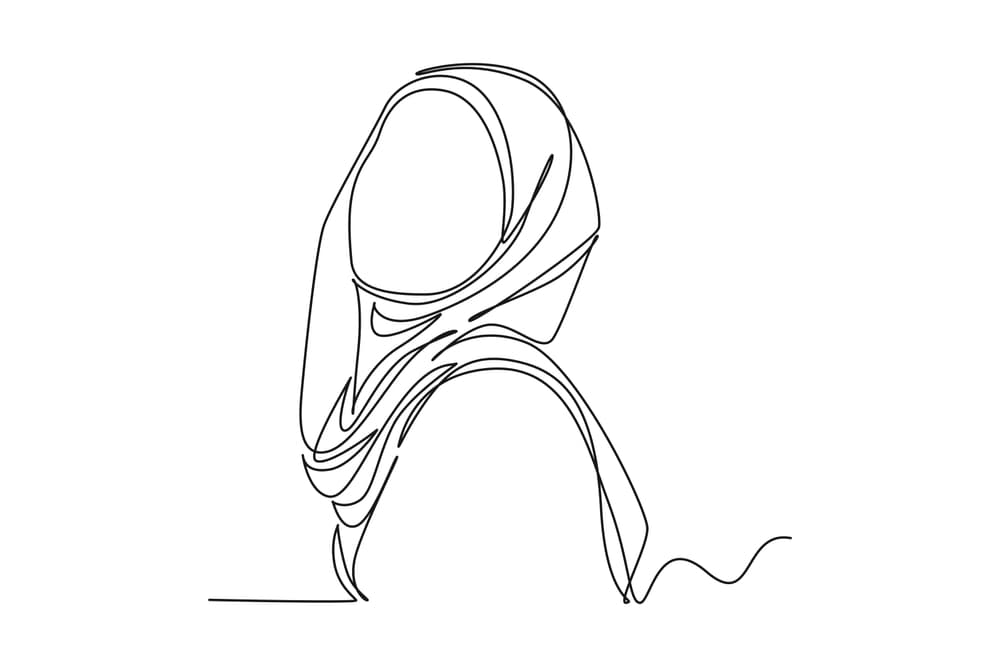
When Can A Woman Take Off Her Hijab?. The hijab is a widely recognized symbol of modesty and faith in Islam, often prompting curiosity and questions from both Muslims and non-Muslims alike. What exactly is the hijab? Why do Muslim women cover their hair? Where and when can a woman take off her hijab? These questions are not just academic; they reflect a deep interest in the cultural and religious practices that shape the lives of millions of Muslim women around the world.
In this article, we will delve into the concept of hijab, exploring its significance and the diverse reasons why Muslim women choose to wear it. We will address common inquiries
BOOK FREE SESSION
What is a Hijab?
To know when can a woman take off her hijab, we should first what is hijab. The hijab is a term that refers to the practice of Muslim women covering their hair and body as a means of modesty and devotion. The word “hijab” itself means “veil” in Arabic, but it is commonly understood to refer to the headscarf that many Muslim women wear. The hijab typically covers the hair, neck, and sometimes the shoulders, while leaving the face visible. It is an expression of modest dress and behavior, which is a significant aspect of Islamic teachings for both women and men.
Why do Muslim Women Cover their Hair?
Many women wonder when can a woman take off her hijab and why Muslim Women Cover their Hair. The hijab is more than a physical garment; it represents our values, attitudes, and the level of respect we expect from others.
Here are some reasons why Muslim women wear hijab :
Self-protection :
The primary intention of the Hijab is to protect women from evil eyes.
In confirmation of this, Allah says, “That will be better so that they may be recognized and not be harmed.”
يقول الله تعالى (ذلك أدنى أن يعرفن فلا يؤذين )
When a woman wears the hijab, immoral and wicked people understand that she is not part of their prey, so Allah protects and preserves her.
Holy Command :
A woman covers her hair because Allah the Almighty has commanded her to do so, and it is not permissible for her to disobey His word and defy His command. Allah did not command this except for the greatest wisdom, among which is to protect a woman’s honor and dignity from human wolves who seek easy prey to attack and devour. The prey becomes appealing only when it is prepared and ready, which is the case with an immodestly dressed woman, who, through her appearance, invites these predators to take whatever they wish from her.
A Symbol of Identity and Integrity:
The Quran provides clear guidance on the purpose of wearing the hijab. It serves as a means of identifying ourselves as Muslim women, reflecting our commitment to truthfulness and our pride in our Islamic identity. By wearing the hijab, we project an image of strength, courage, and integrity. It signifies that we uphold honesty and trustworthiness in all roles—whether as employees, friends, advisors, or counselors.
Self-respect and personal boundaries:
Moreover, The hijab plays a crucial role in delineating these boundaries. It signals to others what is acceptable and what is not. the hijab conveys a strong message about our self-respect and personal boundaries. It asserts that we are not to be treated as objects or taken lightly, and it establishes our expectations for respect and proper behavior.
When the Quran speaks of protection, it does not refer to physical safety from violence but rather to the protection of our dignity, which is safeguarded by our adherence to Islamic values. Our demeanor, characterized by truthfulness and a clear sense of self-worth, ensures that our boundaries are respected and our principles acknowledged.
BOOK FREE SESSION
Read about: Can Men And Women Be Friends In Islam? 7 Rulings Must Know
When Can a Woman Take off her Hijab?

In front of Muslim women :
- Many people wonder when can a woman take off her hijab. A woman is not required to wear a hijab in front of other Muslim women, who are regarded as sisters in faith. This allows for close relationships and a sense of community among Muslim women without the barriers that the hijab might create in such interactions.
It is permissible for a woman to remove her hijab in the presence of other women if the place is free of men who are not her mahram (close relatives whom she cannot marry) That is considered a case when can a woman take off her hijab .
In front of Mahrams :
- In Islam, the concept of mahram dictates that a woman can be without her hijab in the presence of certain immediate family members, such as her parents, grandparents, and children. These individuals are considered mahram, meaning that the hijab is unnecessary in front of them because they are already familiar with her and her modesty is preserved within the family. That is a case when can a woman take off her hijab.
During an Emergency
- In some emergencies, people ask when can a woman take off her hijab. Is it halal to remove it in such cases? In an emergency where a woman’s life or the life of another is at risk, she is permitted to remove her hijab to ensure safety. Once the emergency has passed, she should put her hijab back on.
This rule is grounded in the Islamic principle of prioritizing the preservation of innocent lives. Therefore, in such circumstances, a woman should not hesitate to remove her hijab if it will help save a life.
BOOK FREE SESSION
Read about:
- How to repent for drinking alcohol in Islam?
- Does Kissing Your Wife Break Fast? Understanding Islamic Fasting Rules
When Can a Girl take off her Hijab or When Can A Woman Take Off Her Hijab?
Muslim girls are curious to know when can a woman take off her hijab.in Islam is she considered a girl or a woman? Must she put the hijab on? The hijab is obligatory for a mature, accountable woman. For a young girl, there are no specific requirements regarding her modesty; she can uncover her face and wear shorter clothing without issue. However, it is advisable not to get used to wearing short garments, as this might reduce her sense of modesty as she grows older. Once she reaches maturity, wearing the hijab becomes mandatory, and it must meet the criteria of proper Islamic dress—meaning it should be loose-fitting, non-revealing, and not transparent.
Is it Haram to Take your Hijab off and When Can A Woman Take Off Her Hijab?
For a Muslim woman to remove her hijab in the presence of non-mahram men, or when she leaves her home, is considered an act of disobedience and a violation of Islamic law. For all women who question when can a woman take off her hijab, we say it is haram This behavior incurs the displeasure and punishment of Allah if she does not repent from it.
- Allah the Almighty says:
“Let those who oppose His command beware, lest they be afflicted by a trial or a painful punishment befall them.” [An-Nur: 63].
قال الله تعالى: فَلْيَحْذَرِ الَّذِينَ يُخَالِفُونَ عَنْ أَمْرِهِ أَنْ تُصِيبَهُمْ فِتْنَةٌ أَوْ يُصِيبَهُمْ عَذَابٌ أَلِيمٌ {النور: 63}
- And Allah has said:
“And do not display yourselves as was the display of the former times of ignorance.” [Al-Ahzab: 33].
وقد قال الله عز وجل وَلَا تَبَرَّجْنَ تَبَرُّجَ الْجَاهِلِيَّةِ الْأُولَى.
What Happens if a Muslim Woman Takes off her Hijab in Public?
A mature woman should ask herself when can a woman take off her hijab before taking such action. If removing the hijab or failing to dress modestly is not due to compelling circumstances, it is impermissible(Haram) for a woman to take off her hijab in the presence of non-mahram men or when leaving her home. Such an act is considered a serious sin that incurs the anger of Allah and requires sincere repentance. Allah’s command mandates the hijab: “O Prophet, tell your wives and your daughters and the women of the believers to bring down over themselves [part] of their outer garments. That is more suitable that they will be known and not be abused. And ever is Allah Forgiving and Merciful” [Surah Al-Ahzab: 59].
(يَا أَيُّهَا النَّبِيُّ قُل لِّأَزْوَاجِكَ وَبَنَاتِكَ وَنِسَاءِ الْمُؤْمِنِينَ يُدْنِينَ عَلَيْهِنَّ مِن جَلَابِيبِهِنَّ ذَلِكَ أَدْنَى أَن يُعْرَفْنَ فَلَا يُؤْذَيْنَ وَكَانَ اللَّـهُ غَفُورًا رَّحِيمًا)
It is essential to understand that both Muslims and Muslim women must adhere to the commands of Allah and His Messenger, even when they are challenging or difficult.”It is not for a believer, male or female and ask scholars or read about when can a woman take off her hijab. Allah and His Messenger have decreed a matter that they should have any choice about their affair” [Surah Al-Ahzab: 36].
“وَمَا كَانَ لِمُؤْمِنٍ وَلَا مُؤْمِنَةٍ إِذَا قَضَى اللَّهُ وَرَسُولُهُ أَمْرًا أَنْ يَكُونَ لَهُمُ الْخِيَرَةُ مِنْ أَمْرِهِمْ ۗ وَمَنْ يَعْصِ اللَّهَ وَرَسُولَهُ فَقَدْ ضَلَّ ضَلَالًا مُبِينًا” [الأحزاب: 36]
This is the characteristic of the believers praised by Allah: “The only statement of the believers, when they are called to Allah and His Messenger to judge between them, is to say, ‘We hear and we obey.’ And those are the successful” [Surah An-Nur: 51].
Here is the text of the verse in Arabic:
“إِنَّمَا كَانَ قَوْلَ الْمُؤْمِنِينَ إِذَا دُعُوا إِلَى اللَّهِ وَرَسُولِهِ لِيَحْكُمَ بَيْنَهُمْ أَنْ يَقُولُوا سَمِعْنَا وَأَطَعْنَا ۚ وَأُولَٰئِكَ هُمُ الْمُفْلِحُونَ” [النور: 51]
Read more about When Can A Woman Take Off Her Hijab above.
BOOK FREE SESSION
Can a Muslim Woman Show her Hair to her Husband?
Yes, a Muslim woman is allowed to show her hair to her husband. In Islam, a woman’s husband is considered her mahram (a close male relative with whom marriage is not permissible)according to the answer that we have just provided can a woman take off her hijab, and she does not need to cover her hair or other parts of her body in his presence.
The rules of hijab apply when a woman is in the presence of non-mahram men, but she can be without a hijab around her husband, immediate family members, and other women.
Read more about When Can A Woman Take Off Her Hijab above.
When Can a Woman Take off her Burka ?
when can a woman take off her hijab is different from when can a woman take off her burka because they are not the same The niqab (Burka) is a piece of cloth, usually black, that covers the face and is worn by some Muslim women as part of their hijab along with the abaya. It conceals the entire body of the woman except for the eyes and is prevalent in predominantly Muslim countries. There is scholarly debate among Muslim jurists regarding whether the niqab is obligatory, non-obligatory, or permissible. While the niqab is not compulsory, some scholars consider it recommended for the protection of women, and some go further to deem it obligatory during times of fitna (trials or disturbances)
Does Taking the Hijab off Break Wudu?
Some ask when can a woman take off her hijab and think that taking off her hijab in front of foreign people breaks wudu, that The act of non-mahram men (foreign men) seeing any part of a woman’s body” her hair” does not invalidate wudu (ablution). You are permitted to pray with the previous wudu as long as you have not done anything that nullifies it according to the known nullifiers of wudu. Revealing hair to non-mahram men is not considered one of these nullifiers, as we have previously mentioned.
Read about:
- How to repent for drinking alcohol in Islam?
- Does Kissing Your Wife Break Fast? Understanding Islamic Fasting Rules
- muslim classes online